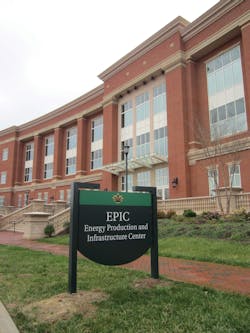UNC-Charlotte Builds Flexible Security Into New Energy Center
The University of North Carolina-Charlotte’s new 200,000 square-foot Energy Production and Infrastructure Center (EPIC) facility uses electronic locks that have the flexibility to modify configurations to meet changing needs while also providing security to protect sensitive experiments and expensive equipment.
UNC Charlotte is North Carolina's urban research university and is among the fastest growing universities in the UNC System, with more than 25,000 students at its 1,000-acre campus. EPIC was formed to supply highly trained engineers qualified to meet the demands of the energy industry. It does this through traditional and continuing education and also provides sustainable support for the Carolina energy industry with increased capacity and support for applied research. EPIC is a highly collaborative industry/education partnership that produces a technical workforce and advancements in technology for the global energy industry while supporting the Carolinas’ multi-state economic and energy security.
Because this mission encompasses direct industry involvement on-site as well as academic activities, many areas need to be secured, both to protect experiments underway and to ensure the security of outside users’ equipment. To provide the needed level of access control, the University selected Schlage AD-Series electronic locks.
The AD-Series locks provide online, real-time access control and are designed with easily replaceable reader modules so they can be changed or upgraded in the future without replacing the entire lock. To simplify installation, they combine all the hardware components required around the door into one integrated design on the door that incorporates the electrified lock, credential reader, request-to-exit switch, door position switch, tamper guard and more.
In the new building, most of these locks are hard-wired. However, many others are wireless. “There are some areas where the users might want to change or upgrade access control later, and it gives us more flexibility than if we had to hard-wire an opening,” explains Access Control Director Robert Herrington.
AD-Series locks are used at other locations on campus as well. Herrington reports there are close to 200 of the locks in various buildings. As in the EPIC building, they often are used to provide security for laboratories. He says, “Woodward Hall has a lot of access control because the labs there use materials that could be dangerous, and they also don’t want anyone who is unauthorized to disturb experiments and ruin months of work.”
One advantage of the easily changeable feature of the locks is their ability to test access control at a location and adjust it to the users’ needs. Herrington notes, “In places like the old gym, we’ll put in a standalone AD-Series device so they can see what it’s like. Then, if it works for them, we just have to upgrade the communication module to a wireless unit to connect to the online network.”
The nature of the facility and its partnership with industry requires dependable yet flexible access control. In addition to classrooms, EPIC includes many laboratories, some of which are rented by outside firms for research. Herrington points out that one area includes a smart grid on which different power scenarios can be tested. Secured electronic locking with card readers helps protect the expensive equipment, sensitive experiments and leading-edge technology thereby ensuring that only authorized personnel have access to these areas. Magnetic stripe cards are used throughout the campus to maintain the same credentials that are used for food services and financial transactions.
In addition to the electronic locks, the EPIC building incorporates several other access control solutions that have built a track record with the University through their long history of use in other campus buildings. Doors that don’t require electronic access control use Schlage locks with the Everest patent-protected keyway to prevent unauthorized duplication, since key blanks are only available from the manufacturer with an authorized signature. LCN door closers ensure that doors close and latch securely, while Von Duprin exit devices provide emergency egress without compromising security. LCN Senior Swing power door operators are installed to meet the accessibility needs of those with disabilities and provide added convenience. Together with the electronic devices, these products provide a comprehensive security system for the new facility.
